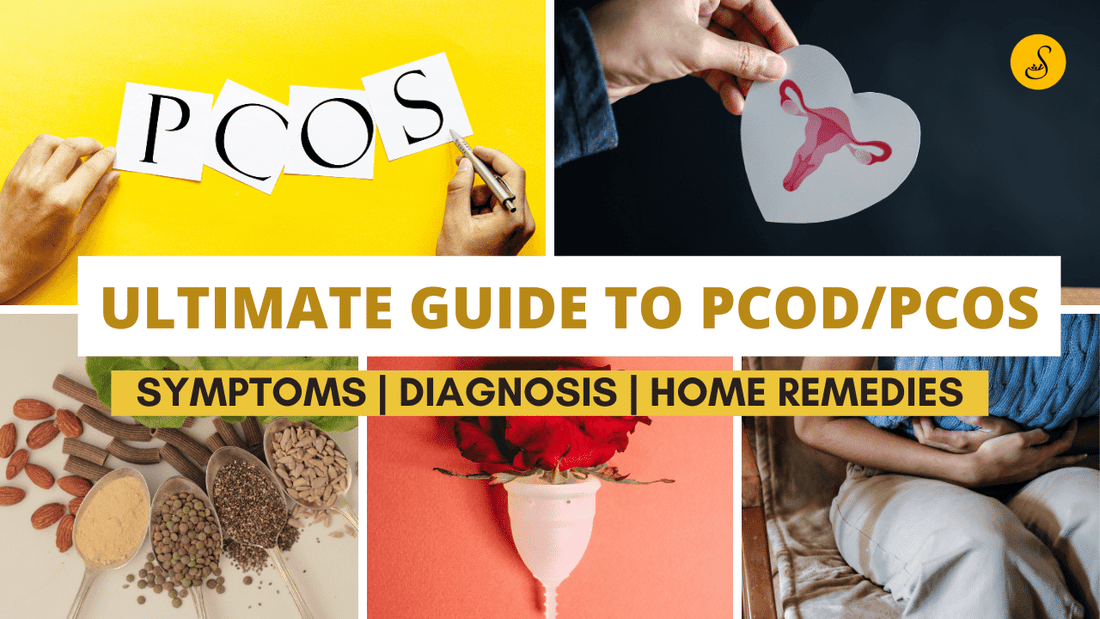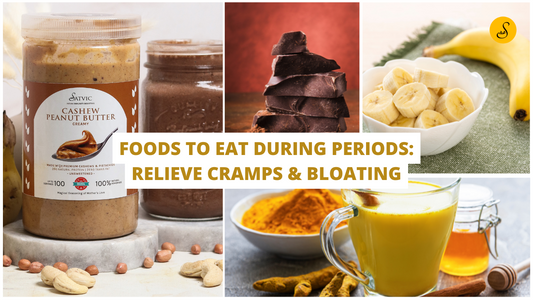The Ultimate Guide to PCOD: Symptoms, Diagnosis, and Remedies

PCOD or PCOS (Polycystic Ovary Syndrome) is a common endocrine/hormonal disorder among women of reproductive age. According to the WHO data, approximately 116 million women are affected by PCOS globally. Despite its prevalence, PCOS often remains undiagnosed due to its diverse symptoms and lack of awareness.
One must be aware that PCOS is not limited to the reproductive system, but it disturbs the overall metabolic health. This is why one experiences several changes in the body, from menstrual irregularity and infertility to weight gain, among others. While PCOS is known to be the most common endocrine disorder, its root causes vary. Sometimes it is hereditary, while most of the time, it results from poor lifestyle choices, namely, physical inactivity, stress, and obesity, among others, which can be cured with a few lifestyle changes.
Whether you suspect you have PCOD or have been diagnosed already, this guide from Satvic Foods will help you better understand the condition and take proactive steps to manage your PCOD symptoms. Let us comprehensively overview PCOD symptoms, causes, diagnosis, how PCOD affects your body, and various management options like PCOD diet plans. You will also learn about the treatments and lifestyle changes to help you manage your symptoms and improve your quality of life.
Understand PCOS, PCOD & its Symptoms:
Sometimes it is difficult to differentiate between PCOS (Polycystic Ovarian Syndrome) and PCOD (Polycystic Ovary Disease) as they share common symptoms. However, PCOS, also known as Stein-Leventhal syndrome, is marked by higher-than-normal levels of male hormones (androgens) and irregular or absent ovulation (anovulation). While in PCOD, ovaries release immature/partially mature eggs leading to hormonal imbalances and swollen ovaries, and these follicles develop into cysts over time.
The term "polycystic" refers to having multiple small cysts in ovaries in a "string of pearls" pattern. However, not all women diagnosed with PCOS have cysts, and not all women with cysts have PCOS.
PCOD/PCOS can lead to a range of symptoms other than irregular periods, acne, weight gain, and difficulty getting pregnant.
- Androgenic Symptoms: Acne, excessive hair growth on the face and body, and hair loss, also termed androgenic alopecia. These are the primary clinical sign often seen in the early teenage.
- Hyperglycemia: PCOD/PCOS causes blood sugar levels to increase, leading to insulin resistance and Type-2 diabetes if not treated on time.
- Weight Gain: Insulin resistance reduces the body's ability to convert glucose into energy, resulting in it being converted and stored as fat around the belly and lower abdomen. Hence, losing weight becomes more crucial to reduce the ill effects of PCOD/PCOS.
- Infertility: PCOD may cause infertility, but PCOS is the most common cause of female infertility. Insulin resistance interferes with the usual hormonal interactions that need for an egg to mature during a healthy menstrual cycle, leading to irregular or no periods at all.
- Anxiety and Depression: Hormonal imbalances result in changes in appearance that negatively impact mental health. This can lead to low self-esteem, relationship/emotional problems, and social stigmatization among affected individuals.
PCOD/PCOS often deprives the body of essential nutrients to function at its best. Further, during the weight loss journey, severe calorie restriction cause the body to starve. Hence, milk, a whole food with calcium, vitamin D, and proteins, can help regulate insulin levels and support weight loss efforts, which may help manage PCOD/PCOS symptoms. Moreover, by adding Golden Milk Masala, a blend of 20 natural spices, seeds, and nuts, into your regular milk, you can effectively address energy and nutrient deficiencies.

Check out Satvic Foods' Golden Milk Masala to make your milk more wholesome!
PCOD/PCOS Diagnosis
Polycystic Ovarian Disease/Syndrome is diagnosed clinically and generally through a combination of physical examination, medical history, and blood tests. The following criteria are considered for the diagnosis of PCOD/PCOS:
- Medical History: The doctor will evaluate your menstrual cycle, including the length and frequency of your cycle. They will also question symptoms you might be newly experiencing, such as acne, hair loss, weight gain, or infertility.
- Physical Examination: A physical examination includes a pelvic check for any signs of ovarian enlargement, fluid-filled sacs, or a thickened, lumpy, or tender ovary.
- Laboratory Tests: Blood tests may be done to check hormone levels, including testosterone, thyroid, prolactin, follicle-stimulating hormone (FSH), luteinizing hormone (LH), and sex hormone-binding globulin (SHBG). High testosterone and LH levels and low FSH and SHBG can indicate PCOS.
Additionally, you might need to perform an ultrasound test to check the presence of multiple cysts in the ovaries. According to the Rotterdam criteria, to confirm PCOS, you must have at least two of the following three criteria:
- Irregular periods or no periods at all
- High levels of androgens and low levels of estrogen in the blood
- The presence of multiple cysts on the ovaries
It is important to note that the Androgen Excess Society (AES) states that there is no single test to diagnose PCOS in women. The diagnosis is evaluated on a combination of the above factors.
How Serious is PCOS and its Adverse Effects
Health practitioners have linked PCOS with poor metabolic health, especially insulin resistance, that promotes androgen production. Other factors such as physical inactivity, excess junk and sugar intake, poor sleep, and chronic stress add to the insulin and other hormonal balance because they are interconnected. It may lead to insulin resistance if not treated on time.
Ovaries have theca cells that produce hormones and have insulin receptors. When insulin stimulates theca cells, they start secreting higher levels of androgens. Further, rising insulin levels also interfere by lowering adiponectin levels, an anti-diabetic hormone secreted by the fat cells. This is why the chances of getting diabetic manifold when women are diagnosed with PCOS.
How to Cure PCOD at Home
PCOS and PCOD have no permanent cure, but fortunately, you can control them with a few lifestyle changes. Based on the condition, you might be prescribed birth control and progestin to keep menstruation in check. Further, some patients also need to take metformin to regulate glucose and reduce insulin resistance.
A holistic lifestyle and optimized, balanced and healthy Indian satvic diet play a promising role in reducing PCOS/PCOD symptoms naturally. With some natural and home remedies for PCOS/PCOD, one may definitely improve the symptoms within a few weeks. Some of the following measures can be taken are:
- Balanced Diet: Cut down on all processed, saturated fats, and sugary foods. Instead, include natural whole grains, fruits, vegetables, and lean proteins in your diet. Include low-carb and high-protein foods to regulate insulin levels and promote weight loss. Incorporate magnesium-rich foods like almonds and bananas to reduce high blood pressure and metabolic elements in women with PCOS.
- Stress Management: Chronic stress leads to sleep apnea which disrupts hormone balance. Hence, find ways to manage stress, like practicing mindfulness, spending time in nature, meditation, yoga, and deep breathing exercises.
- Physical Activity: Regular physical activity can improve cardiac stress and insulin resistance and reduce excess weight, which is severely associated with PCOS. Even 30 minutes of a gym, and moderate exercises, such as walking or cycling, can be effective.
- Herbal Supplements: Some herbs and spices like turmeric help regulate menstrual cycles, and pumpkin seeds aid in regulating blood sugar levels in women with PCOS. Moreover, sunflower seeds contain healthy monounsaturated and polyunsaturated fats, rich in antioxidants that help reduce inflammation, support heart health, and protect against cell damage and diseases. In comparison, saffron is traditionally used as a mood enhancer.
Satvic Foods' Golden Milk Masala is a power pack of 20 spices, seeds, and nuts to nourish the body, mind, and soul. However, speaking with your healthcare provider before taking any herbal supplements is essential, as they may interact with other medications or have potential side effects.

Managing PCOD/PCOS is Possible With Satvic Foods
To summarize, while there is no permanent remedy for PCOD/PCOS, some lifestyle changes along with medication can help reduce its symptoms. Compared to women affected by PCOS, those with PCOD have a higher probability of conceiving. With timely medical assistance and lifestyle changes, approximately 80% of women with PCOD can successfully achieve pregnancy.
If you suspect you have PCOS, making an early diagnosis is important. It helps prevent long-term complications, such as Type-2 diabetes and heart disease. Women with PCOS should mindfully develop a treatment and diet plan tailored to their health needs and goals.
Additionally, the keto diet with home remedies helps women with PCOD/PCOS lose weight at home by improving sex hormones, reducing cholesterol levels, regulating menstrual cycles, and improving fertility. Furthermore, adequate milk intake for calcium and vitamin D may help support bone health and also improve insulin resistance.
Add the organic and all-natural Satvic Foods' Golden Milk Masala and make your PCOS healing journey comfortable.

No comments








comments